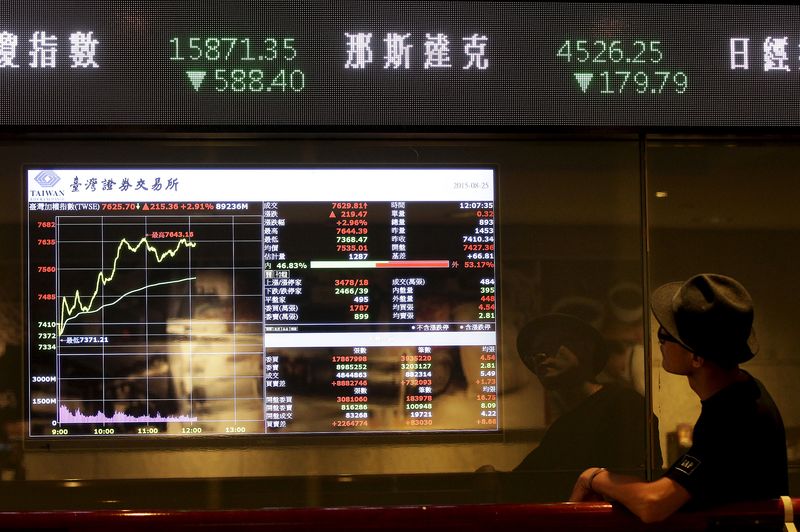United Homes Group stock plunges after Nikki Haley, directors resign
Investing.com-- Most Asian stocks moved in a flat-to-low range on Thursday amid little relief from uncertainty over U.S. trade tariffs and interest rates, while chipmaking stocks underperformed ahead of closely watched earnings from bellwether TSMC.
Australian markets were outperformers for the day, coming close to record highs as dismal labor data ramped up bets on more interest rate cuts by the Reserve Bank of Australia.
Regional markets took few positive cues from a mildly stronger overnight close on Wall Street, as Trump’s August 1 tariff deadline drew closer with only a handful of trade deals being signed so far.
Wall Street took limited support from a swathe of strong bank earnings, given that the country’s lenders warned of an uncertain economic outlook. More second-quarter earnings are due in the coming days, with Netflix (NASDAQ:NFLX) set to report later on Thursday.
S&P 500 Futures fell 0.2% in Asian trade.
Among Asian bourses, Japan’s Nikkei 225 fell 0.3%, while the TOPIX was flat. Trade data for June showed sustained weakness in the country’s exports, amid pressure from U.S. tariffs on steel and automobiles.
China’s Shanghai Shenzhen CSI 300 and Shanghai Composite indexes inched higher, while Hong Kong’s Hang Seng steadied after clocking strong tech-driven gains in the past two sessions. Markets were now waiting to see just when NVIDIA Corporation (NASDAQ:NVDA) will resume selling a key artificial intelligence chip in China, after the company said Washington intended to allow such a move.
Singapore’s Straits Times index rose 0.3% following substantially stronger-than-expected non-oil export data for June, which improved after months of sustained declines. Gift Nifty 50 Futures for India’s Nifty 50 index were flat.
South Korea’s KOSPI fell 0.4%, pressured chiefly by losses in major chipmaking stocks.
Asia chipmakers fall on ASML warning; TSMC earnings awaited
Major Asian chipmaking stocks moved in a flat-to-low range on Thursday after chipmaking equipment supplier ASML Holding NV (AS:ASML) warned that it may not achieve revenue growth in 2026, even as robust AI demand helped its second-quarter bookings beat estimates.
The company said that uncertainty over U.S. tariffs saw several chipmakers delay finalizing investments– which could weigh on chip demand in the coming months.
Among Asian chipmakers, South Korea’s SK Hynix Inc (KS:000660) was by far the worst performer. The stock sank over 8% after Goldman Sachs downgraded the stock to Neutral, citing expectations of margin pressures from increased competition in the memory chip sector.
SK Hynix rival Samsung Electronics Co Ltd (KS:005930) rose 1.7%, while Japan’s Tokyo Electron Ltd. (TYO:8035) and Advantest Corp. (TYO:6857) shed about 2% each.
China’s Semiconductor Manufacturing International Corp (HK:0981) rose slightly.
TSMC (NYSE:TSM) (TW:2330), the world’s largest chipmaker, fell 0.9% in Taiwan trade, with focus squarely on its second-quarter earnings due later in the day. While the company is expected to clock strong earnings on sustained AI-fueled demand, focus will be squarely on any changes to its outlook, amid U.S. tariff uncertainty and unfavorable foreign exchange moves.
TSMC and ASML are largely regarded as bellwethers for the chip industry, given their key roles in the supply chain.
Australian shares outperform, near record highs as soft jobs fuel rate cut bets
Australia’s ASX 200 index was the best performer in Asia, rising 0.7% and coming within spitting distance of a record high.
Gains were driven chiefly by increased bets on more interest rate cuts by the RBA, after employment data for June read substantially weaker than expected.
The RBA has cited inflation and the labor market as its biggest considerations for rates, and may now be spurred into further easing to prevent more labor market weakness.
Macquarie analysts flagged a bullish outlook for Australian stocks in a Wednesday note, stating that tech and cyclical stocks were set to benefit from lower rates across the globe.
